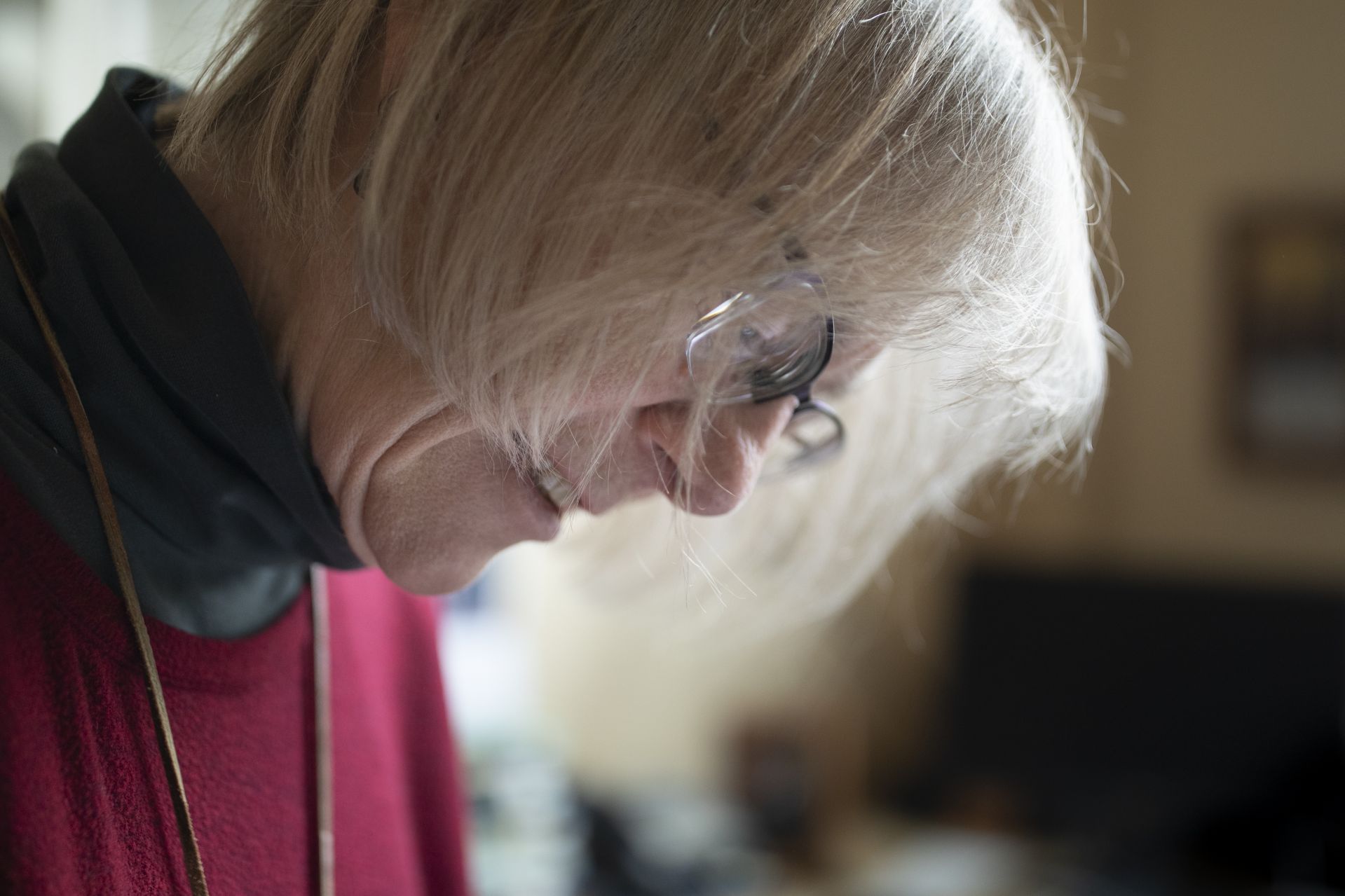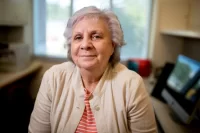
Various shelves and closets, both in and around Jane Costlow’s office in Hedge Hall, are filled with bound senior theses from years gone by.
Costlow selects one and reads the acknowledgement. The senior thanked Costlow for “an enlightening process” during a time when Costlow was “dealing with hard times herself. She made herself available and helped me through my own.”
Costlow wonders about the “hard times” reference. Checking the date, 2009, she remembers: “That was the year my father died.” Such touching acknowledgments are a “reminder of these wonderful students I’ve had,” Costlow says.
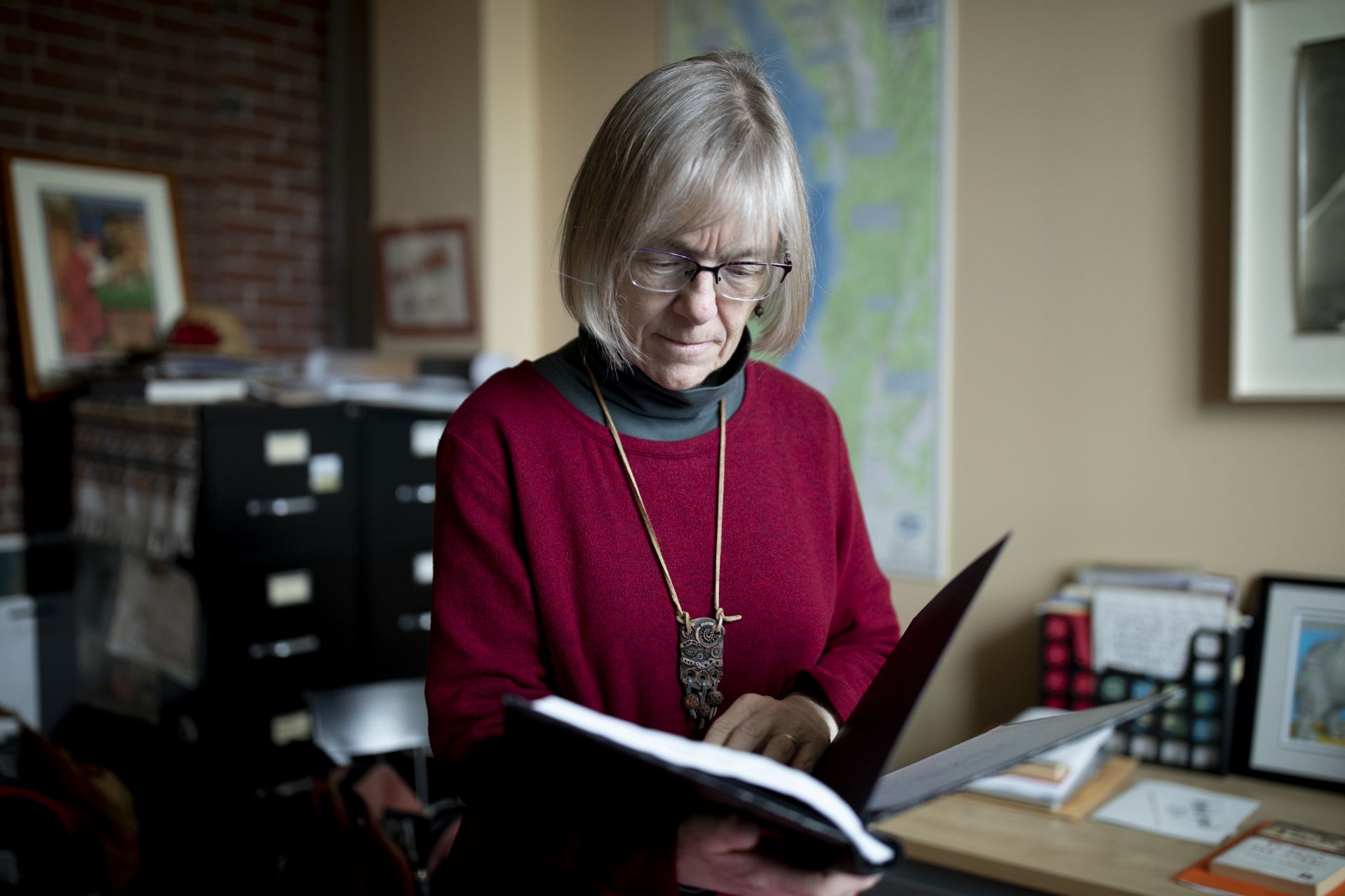
Jane Costlow reads the acknowledgments from a former student’s senior thesis. (Phyllis Graber Jensen/Bates College)
The college’s Clark A. Griffith Professor of Environmental Studies, Costlow is now in her 34th and final year in the Bates classroom. Adding it all up, she’s advised well over 100 thesis students in her career.
“The heart of the thesis experience is having a student who comes once a week and sits in your office and talks with you about this topic that they’re having the pain and the pleasure of getting to know a lot better, that they’re really diving into,” she says.
In that sense, it’s timeless, no different from when Costlow first began. “I really love the one-on-one interaction.”
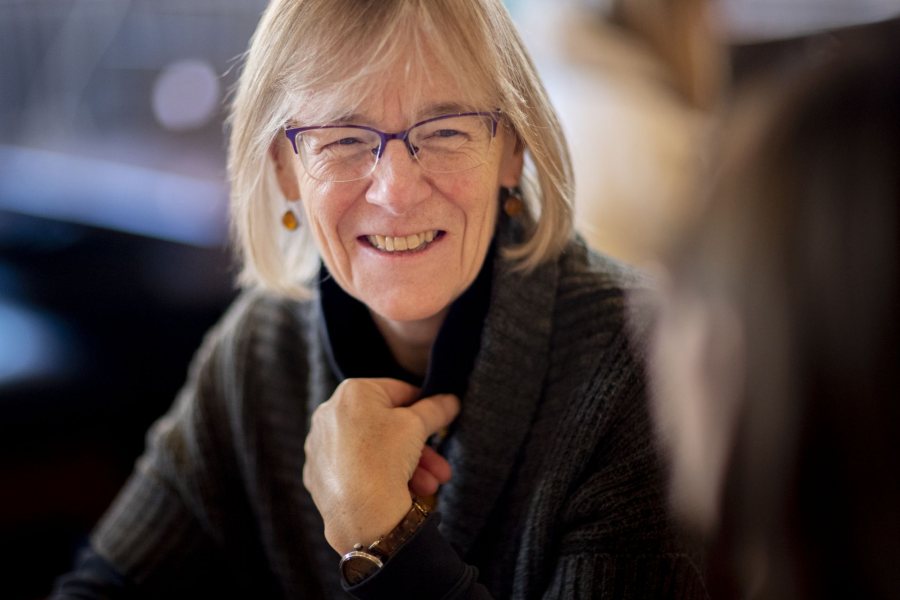
Jane Costlow meets with thesis student Erin O’Farrell ’20, environmental studies major from Burke, Vt., who is writing on the photography from Hurricane Maria in Puerto Rico with an environmental perspective. (Phyllis Graber Jensen/Bates College)
The one-on-one model is also intensive, making the month of March a notorious crunch time for both seniors and professors, coming in like a lamb and going out like a lion as seniors generate reams of thesis pages for their advisers in advance of the April 10 submission deadline.
As March progresses, says Costlow, faculty “get more bleary-eyed just because of how many pages they have to read.”
Easing the load somewhat in recent years is a new thesis option for environmental studies majors. Instead of a traditional independent thesis, they can choose to take a seminar course called “Environmental Writing in the Public Sphere.”
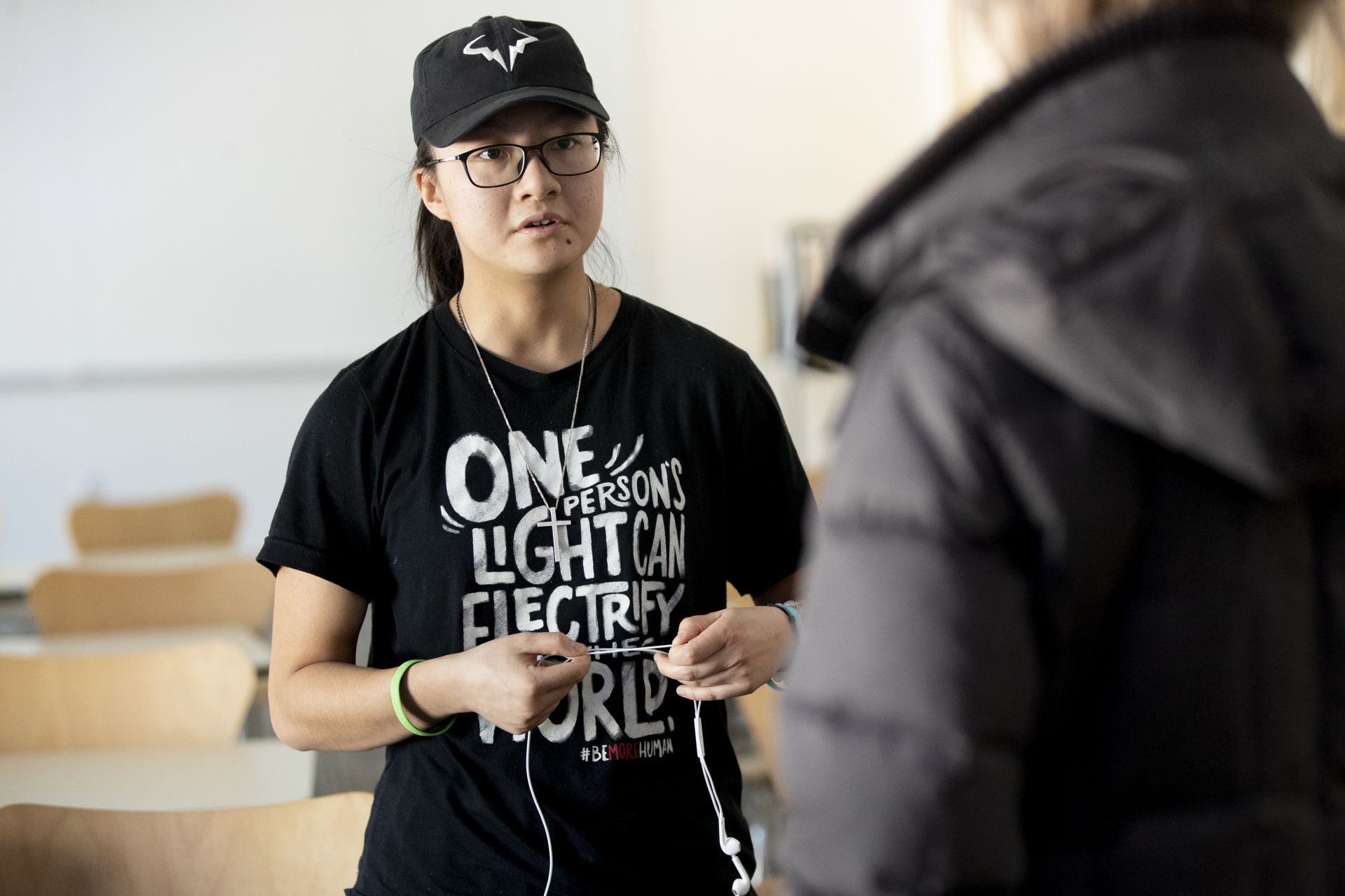
Environmental studies major Hermione Zhou ’21 of Shenzhen, China, speaks with Costlow about possible thesis topics for next year. (Phyllis Graber Jensen/Bates College)
Costlow taught the seminar last year, guiding students in major projects including documentary film and long-form digital journalism, such as podcasts. “They’re really useful formats and genres for students to learn about producing work for which they still have to do all of the deep research” required for a traditional thesis.
One of her 2019 seminar students, Hugh Kenny ’19, produced a film about the Auburn, Maine, agricultural zone; now he’s working as a communications fellow and videographer for the Piedmont Environmental Council, a land trust in Virginia.
This semester, Grace Ellrodt ’20 of Lenox, Mass., started as one of Costlow’s thesis advisees then switched to the thesis seminar, a better fit for a project that grew out of work she’d done in Chile and Colombia investigating the public health issue of loneliness among older people. Ellrodt’s project includes a photography exhibit and website — a launching pad, she hopes, for a career in digital public-health journalism.
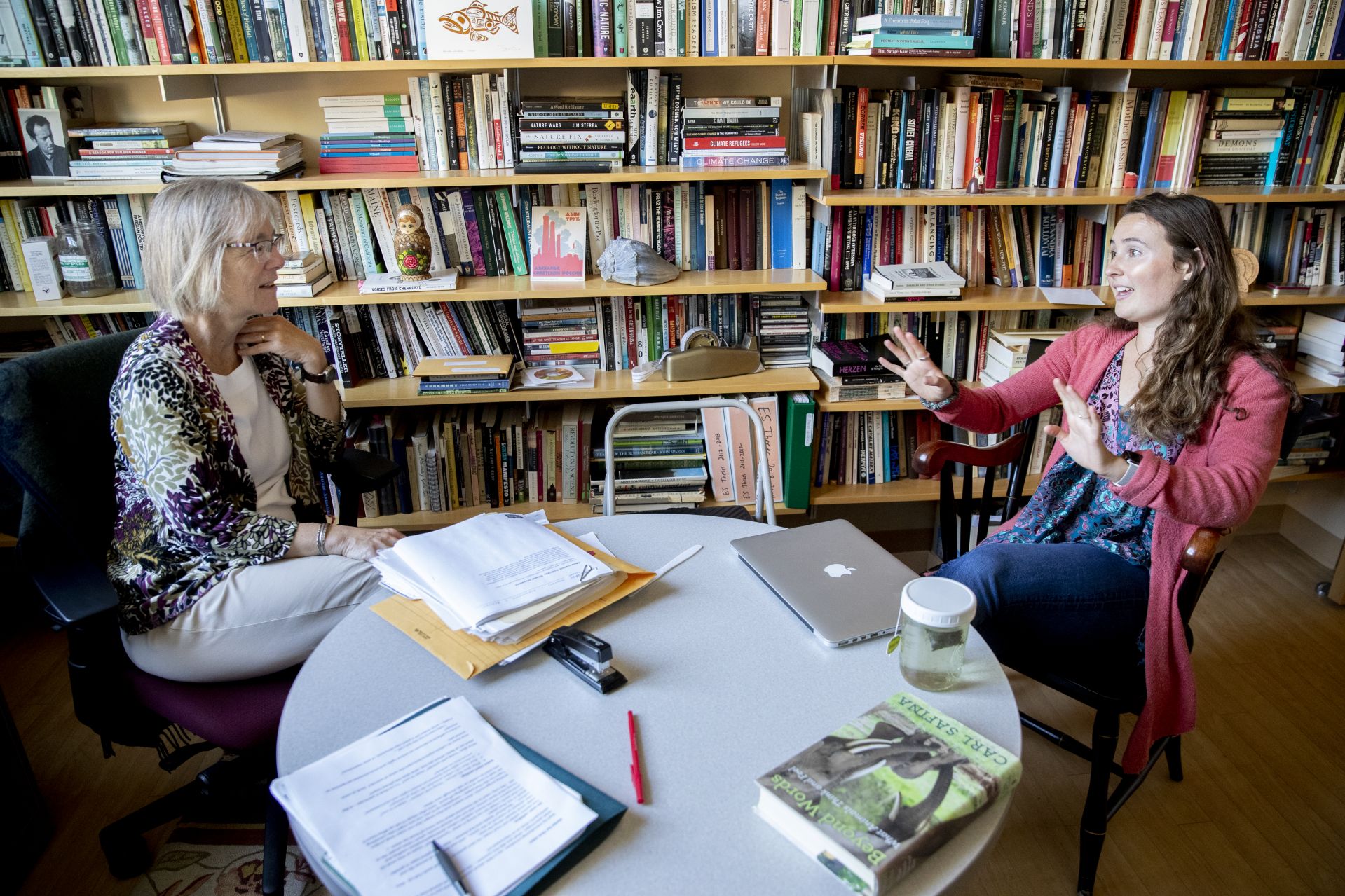
Grace Ellrodt ’20 discusses her thesis in Costlow’s Hedge Hall office at the beginning of the fall 2019 term. (Phyllis Graber Jensen/Bates College)
It’s no coincidence that many of Costlow’s thesis advisees are interested in film and photography. Costlow, who for many years taught in the college’s Russian program, teaches courses in environmental literature and over the years has expanded her interest in visual culture.
“It’s something I always did when I was teaching Russian because it’s such a fabulous way to give a rich, complex sense of the culture. And our students are really visual,” she says. “In environmental studies, we do a lot of class work in looking at documentaries and photographic traditions that have been really important in American environmentalism.”
For example, one of her current thesis students, Ava Gulino ’20 of Wilmington, Del., is focusing on the island of Antigua to explore the connection between tourism and photography. “She’s looking at how Antigua gets represented and marketed as a ‘paradise,’ and what that marketing tends to obscure or erase,” Costlow explains. “And then, within that context, she’s also looking at what it might mean to be a mindful and responsible visitor.”

Ava Gulino ’20 of Wilmington, Del., meets weekly with Costlow in her office. (Phyllis Graber Jensen/Bates College)
Costlow herself has just finished writing a paper that is, in part, about contemporary Russian photography. “It’s a good example of how my own work and student work can overlap in some ways.”
At Bates, the thesis experience varies enormously from one academic division to another. In the social sciences and especially in STEM disciplines, for example, thesis topics often reflect a faculty member’s research, with students becoming integral members of their adviser’s lab.
“And that’s really exciting,” Costlow says, noting how meaningful it is for students of environmental studies colleague Holly Ewing to do field research on water quality on Lake Auburn, read the literature, and then make sense of it.
For majors in the humanities, the experience and approach is different, Costlow says. “It almost always involves letting the student become the expert,” she says. “The student becomes the person who, in a way, is teaching you.” The student, in a way, becomes the “sage on the stage.”
Jane Costlow describes the joy of senior thesis advising and how she helps seniors develop their topics. (Phyllis Graber Jensen/Bates College)
Often, her advisees will choose a subject about which she knows very little; in that situation, Costlow’s approach as adviser is to ask good questions and push back against assumptions. “It’s up to them to develop expertise and read broadly within the relevant literature.”
She worked with one thesis writer who was investigating the treatment of elephants in northeastern India. Costlow knew little about the topic and learned a lot — an experience, she says, that can mean “really stretching yourself as a teacher to think about how you can be helpful.”
The theses on the shelves in and around Costlow’s office don’t just sit there. She pulls out certain ones to show current seniors how past writers have approached a certain topic.
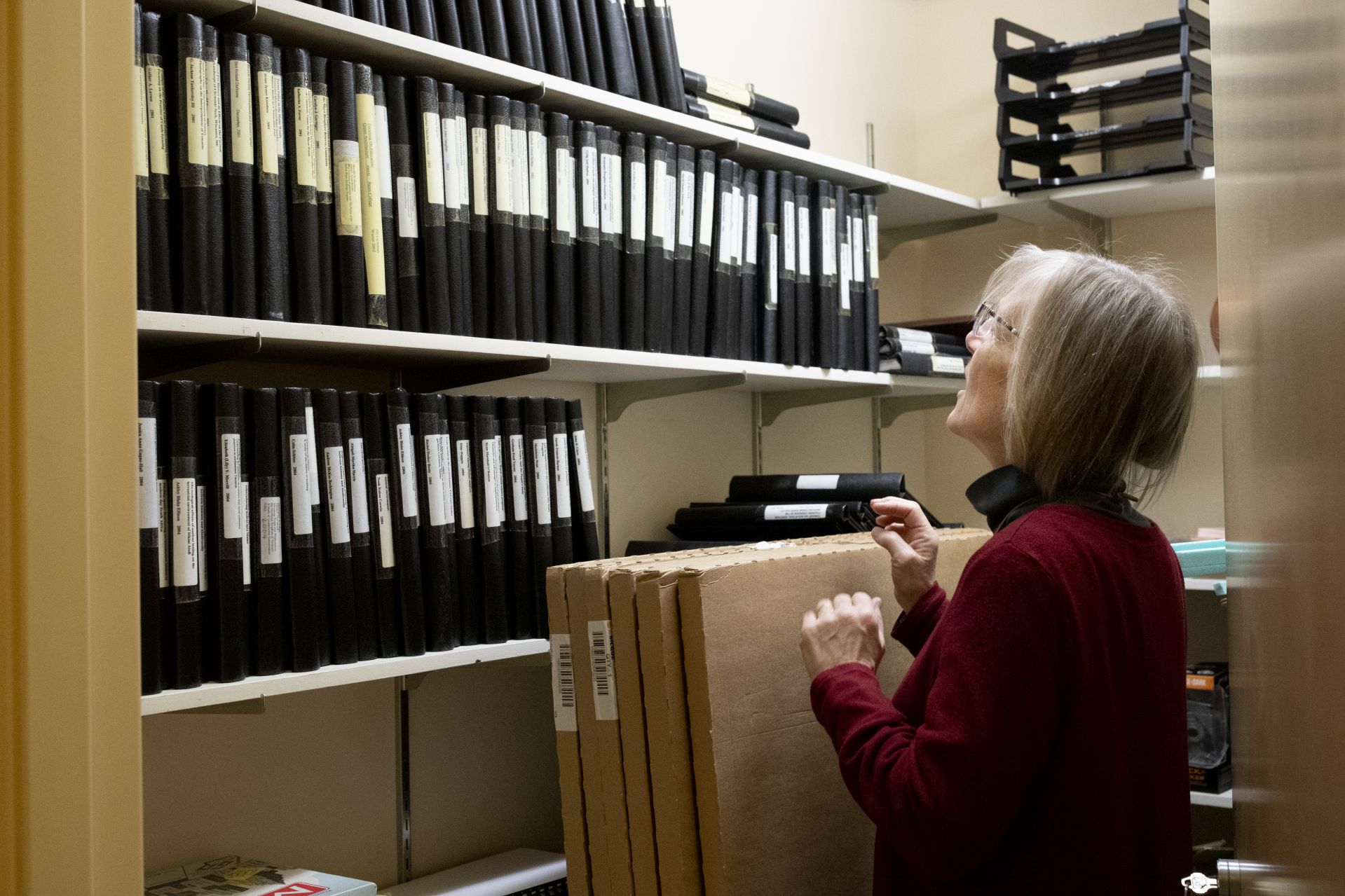
Costlow inspects thesis binders stored in an environmental studies area in Hedge Hall. (Phyllis Graber Jensen/Bates College)
One favorite was a thesis written by Patricia Noto ’12, now a landscape designer at G2 Collaborative, who explored how colleges and universities developed farms and gardens on campus. After writing an outstanding thesis, she wrote a proposal for how Bates could develop such an operation.
Of course, there are the infamous bumps, if not complete washouts, on the thesis road.
There are the advisees who, week after week, refuse (or say they forgot) to try a new approach or resource. Costlow recalls asking a student to consult with one of the college’s research librarians. “Our librarians are incredibly valuable sources of insight — not just information. They give student tools they’ll use all their lives.”
But week after week, the student reported that he’d not yet done so. Finally, in the dying days of the semester, the student had the meeting. “Wow!” the student exclaimed to Costlow afterward. “I should have gone to see him months ago!”
Costlow chuckles at the memory. “My only regret was that I didn’t have him on video, so I could show all my thesis students.”
When it comes to evaluating and grading this pivotal capstone, the thesis is “completely unlike any other grading experience,” Costlow says.
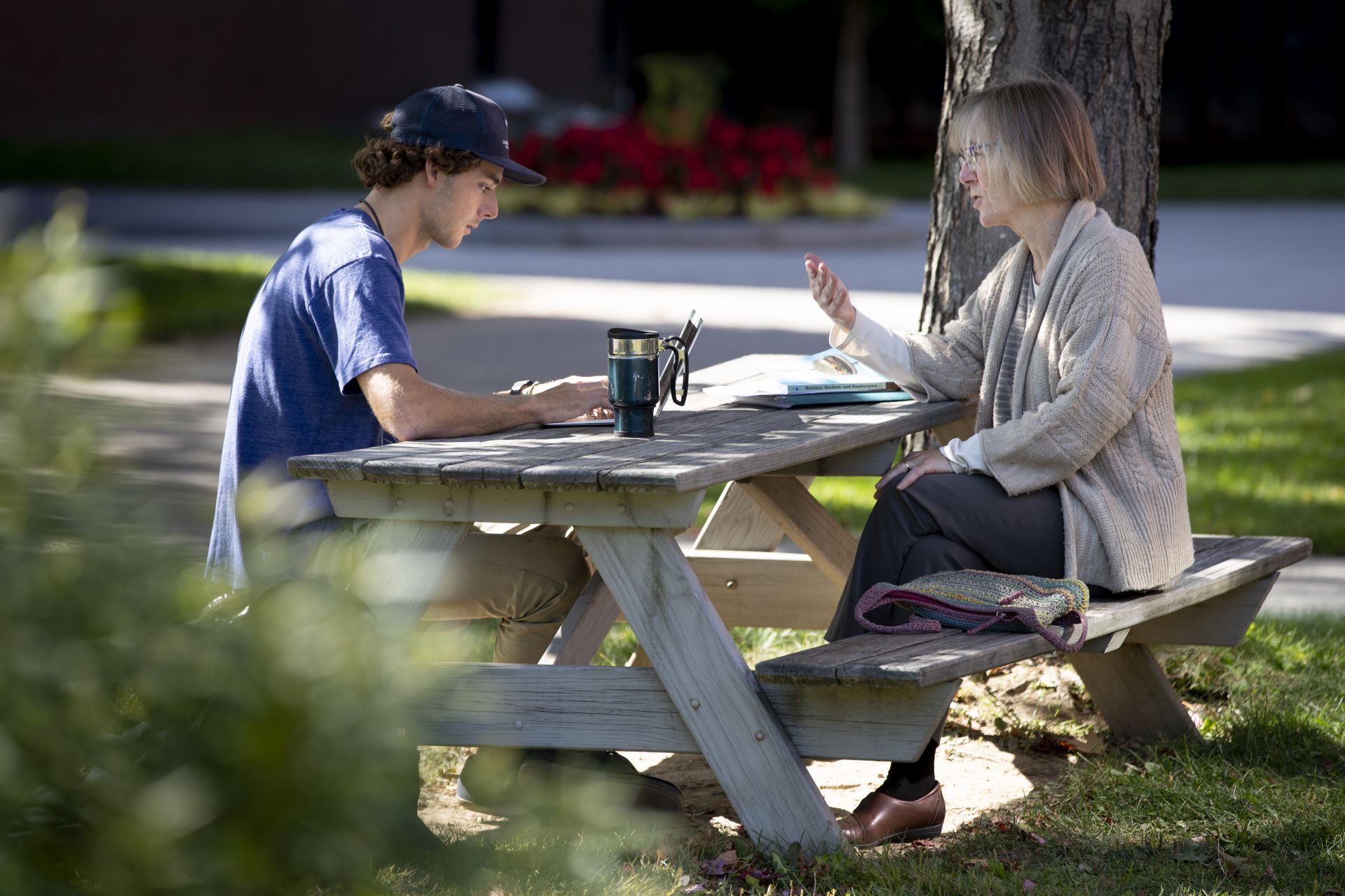
Costlow discusses thesis ground rules with fall semester thesis advisee Lars Schuster ’20 as he embarks on his study of offshore wind farms in New England. (Phyllis Graber Jensen/Bates College)
With each student, she tries to have an initial conversation, an up-front opportunity to discuss what’s involved in writing a thesis and what she expects a student to do in terms of source materials and bibliography, so that she has something to return to when she needs to say, “This is really not adequate.”
That rarely comes to pass, partly because, she finds, the students are really grading themselves, “sort of playing against themselves. They’ve set a standard of what they’re capable of, and you hope they live up to it. And you hope they set high goals for themselves.
“That’s my way of saying that I have different expectations for different thesis students based on my understanding of who they are as a student.”
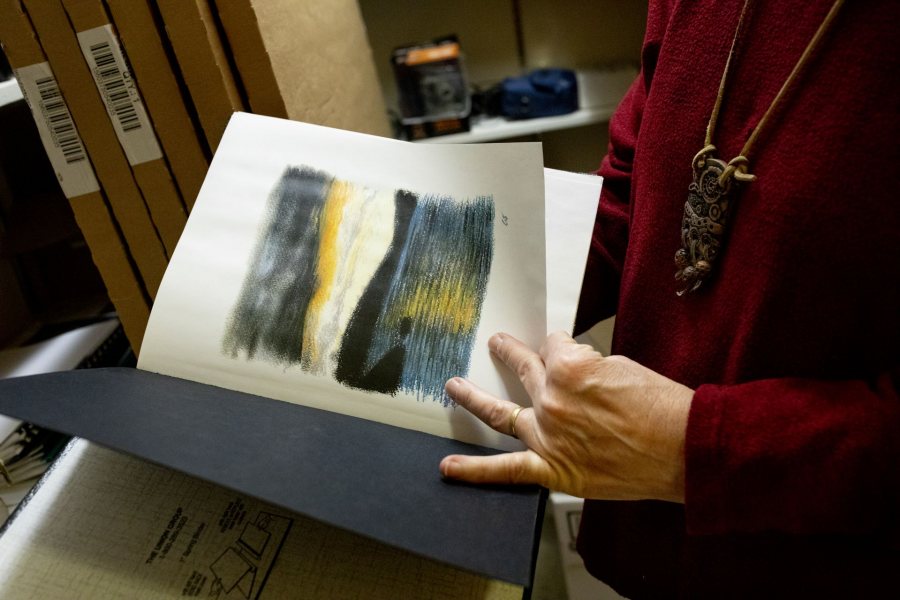
Costlow opens a senior thesis by Colin Schless ’04 titled “Two Roads Maine: A Study of the Nature in Healing.” (Phyllis Graber Jensen/Bates College)
And then there are the students who blow off their regular meetings. At that point, Costlow isn’t going to play games. “I say, ‘You know what? You’re close to graduating. You’re grown up. If you think you can pull this off without my input, give it a try.’”
One student never came in to see her and spent the last 10 days of the semester camped out in the program’s lounge writing day in, day out. “He handed in an amazing thesis — for the first chapter and a half. Then it just fell completely apart.”
And then there are the big kahunas: the year-long honors theses. A memorable advising experience transpired last year with an advisee who investigated the concept of dignity and migrant labor in her home state, North Carolina, where Costlow also grew up.
“It was just a sheer joy to work with her,” she says, because the thesis embodied the powerful interdisciplinarity of environmental studies, incorporating political and intellectual history, ethnography, and nonfiction creative writing. The alumna has gone on to work with migrant laborers in the South.
As the month of March marches toward the end of the winter semester, Costlow approaches the conclusion of her thesis advising. She opens another black binder and reads the acknowledgment: “I enjoyed our meetings where we not only discussed subjects pertaining to my thesis, but also current events, activism, and personal stories. I will miss those meetings.”
So will Costlow.
